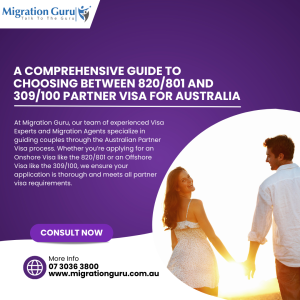Deciding to apply for a Partner Visa Australia is a significant step toward building a future together with your partner in Australia. However, understanding the differences between the 820/801 and 309/100 visa subclasses is crucial to ensuring a smooth visa application process. Each visa path caters to different circumstances—whether you’re applying from within Australia or from overseas. In this guide, we’ll break down the key differences, processes, and benefits of these visas to help you make an informed decision.
What Are 820/801 and 309/100 Partner Visas?
 The 820/801 and 309/100 visas are designed for partners of Australian citizens, permanent residents, or eligible New Zealand citizens. Both visa types offer a pathway to permanent residency, but they differ in terms of where you must be when you apply and when the visa is granted.
The 820/801 and 309/100 visas are designed for partners of Australian citizens, permanent residents, or eligible New Zealand citizens. Both visa types offer a pathway to permanent residency, but they differ in terms of where you must be when you apply and when the visa is granted.
820/801 Partner Visa (Onshore)
The 820/801 Partner Visa is for individuals who are already in Australia when they apply. This visa allows you to remain in Australia while your application is being processed.
- 820 Visa (Temporary): The first step is obtaining the 820 Visa, which is a temporary visa that allows you to live, work, and study in Australia. You must be onshore when you apply for this visa.
- 801 Visa (Permanent): After holding the 820 Visa for a period (usually two years), you can apply for the 801 Visa, which grants permanent residency in Australia. This visa allows you to stay indefinitely, work, study, and access Medicare and other social security benefits.
309/100 Partner Visa (Offshore)
The 309/100 Partner Visa is intended for individuals who are outside Australia when they apply. This visa enables you to enter Australia to be with your partner and eventually achieve permanent residency.
- 309 Visa (Temporary): The 309 Visa is the first stage of the process, allowing you to live, work, and study in Australia while waiting for the permanent visa decision. You must be offshore when you apply for this visa.
- 100 Visa (Permanent): Once you have held the 309 Visa for a certain period, typically two years, you can apply for the 100 Visa, which grants you permanent residency in Australia.
Key Differences Between 820/801 and 309/100 Partner Visas
Understanding the differences between these visa subclasses is vital to selecting the correct pathway for your situation. Here’s how they differ:
- Location: The most significant difference is your location at the time of application. The 820/801 Visa requires you to be in Australia, while the 309/100 Visa requires you to be outside Australia.
- Application Process: Both visa streams involve a two-stage process, starting with a temporary visa (820 or 309) and leading to a permanent visa (801 or 100). However, the waiting periods and eligibility criteria may vary depending on your circumstances.
- Timing: The pathway to permanent residency typically begins once your temporary visa (820 or 309) is granted. After holding the temporary visa for a specified period (usually two years), you can apply for the permanent visa (801 or 100).
- Rights and Benefits: Both visas allow you to live, work, and study in Australia, but the permanent residency granted by the 801 or 100 visa offers additional rights, such as access to Medicare and other social security benefits.
Frequently Asked Questions (FAQs) for Australian Partner Visas
Applying for a Partner Visa Australia often raises several specific questions that can impact your application. Here are some of the most common FAQs that we encounter:
1. How do I prove my relationship is genuine and ongoing?
Providing evidence that your relationship is genuine and ongoing is critical to a successful Partner Visa application. Common evidence includes joint financial statements, shared household bills, photos together, and travel records. It’s important to provide a variety of evidence that covers different aspects of your life together.
2. Can I include evidence in a language other than English?
All documents not in English must be translated by a certified translator. Both the original document and the certified translation should be submitted with your application. This ensures that the Department of Home Affairs can fully assess your application.
3. What happens if my partner and I have been living apart due to work or other reasons?
If you and your partner have been living apart due to work commitments or other reasons, it’s essential to provide evidence of your ongoing commitment. This can include communication logs, travel records showing visits to each other, and plans for reunification.
4. My partner has a criminal record. Will this affect our application?
A criminal record can impact your application, depending on the nature and severity of the offense. It’s crucial to disclose this information upfront and seek advice on how to address it in your application to mitigate any potential issues.
5. We haven’t been together for 12 months—can we still apply for a de facto visa?
If you haven’t been in a de facto relationship for 12 months, you may still be eligible if you can demonstrate compelling reasons, such as having registered your relationship in an Australian state or territory. It’s advisable to seek guidance on how to present your case effectively.
6. What should we do if our visa application is taking longer than expected?
Processing times for Partner Visas can vary, and delays can occur. If your application is taking longer than expected, it’s important to ensure that all required documents have been submitted. You can check the status of your application through ImmiAccount, but for any urgent concerns, consulting with a migration agent can provide clarity.
7. Can I include children from a previous relationship in my Partner Visa application?
Yes, you can include children from a previous relationship in your Partner Visa application. It’s important to provide evidence of their relationship to you and your partner, and they may need to meet certain health and character requirements.
8. My partner is an eligible New Zealand citizen—does that change anything?
Partners of eligible New Zealand citizens have slightly different criteria compared to those partnered with Australian citizens or permanent residents. It’s important to understand these differences and ensure your application meets the specific requirements.
9. How does domestic violence impact my Partner Visa application?
If you are experiencing domestic violence, there are provisions in place to protect you and allow you to continue your Partner Visa application independently. It’s important to seek immediate support and inform the Department of Home Affairs as soon as possible.
10. What happens if my visa is refused?
If your Partner Visa is refused, you may have the option to appeal the decision or apply for a review through the Administrative Appeals Tribunal (AAT). Understanding the reasons for the refusal is critical to determining your next steps.
11. Can I travel outside Australia while my Partner Visa application is being processed?
Traveling outside Australia while your Partner Visa application is being processed can impact your application, especially if you are on a bridging visa. It’s advisable to check your visa conditions before making any travel plans.
12. What if my circumstances change while waiting for my permanent visa?
Changes in your situation, such as moving to a new location or changing jobs, should be reported to the Department of Home Affairs. Depending on the nature of the change, it may affect your eligibility for the permanent visa, so it’s important to seek advice.
13. Can I work while my Partner Visa is being processed?
Whether you can work while your Partner Visa is being processed depends on the type of visa you hold. Most applicants on a bridging visa associated with a Partner Visa can work, but it’s important to check your specific visa conditions.
14. What happens if we have a baby while my visa application is being processed?
If you have a child while your Partner Visa application is being processed, you can add your child to the application. You will need to provide the necessary documents, such as the child’s birth certificate, and inform the Department of Home Affairs of the change.
Why Your Choice of Visa Matters
Choosing between the 820/801 and 309/100 Partner Visas is crucial as it directly affects your Australian immigration journey. If you’re already in Australia, the 820/801 Visa is the appropriate choice. However, if you’re applying from outside the country, the 309/100 Visa is the right path.
Selecting the correct visa stream not only ensures that your application process is smooth but also helps avoid unnecessary delays and complications. Making an informed decision can significantly impact your ability to secure permanent residency in Australia.
How Migration Guru Can Help
At Migration Guru, we specialize in navigating the complexities of Australian immigration and ensuring that your Partner Visa application is robust and well-prepared. Our team of experienced Visa Experts and Migration Agents is dedicated to guiding you through every step, whether you’re applying for an Onshore Visa like the 820/801 or an Offshore Visa like the 309/100.
We understand the intricate partner visa requirements and are committed to helping you and your partner secure a future together in Australia. From preparing your initial visa application to ensuring all necessary documents are submitted, we provide comprehensive support throughout your immigration journey.
Ready to Apply?
If you’re ready to take the next step in your relationship and move forward with your Partner Visa Australia application, contact Migration Guru today. We’ll help you determine which visa option is right for you and ensure your application process is as smooth as possible.
Connect with Us
Stay updated with the latest migration news and opportunities:
- Website: www.migrationguru.com.au
- LinkedIn: Migration Guru Pty Ltd
- Facebook: Migration Guru
- Email: info@migrationguru.com.au

